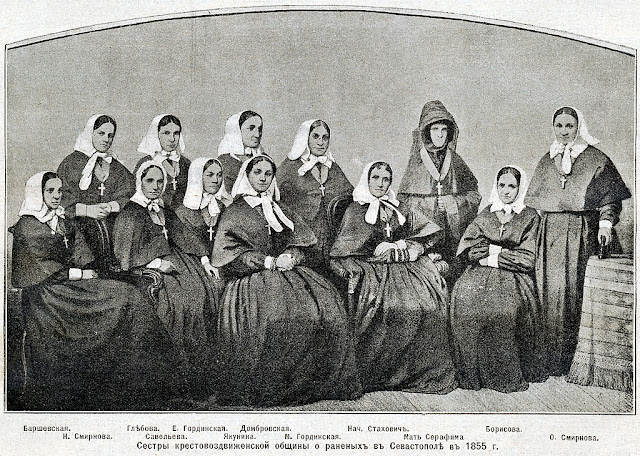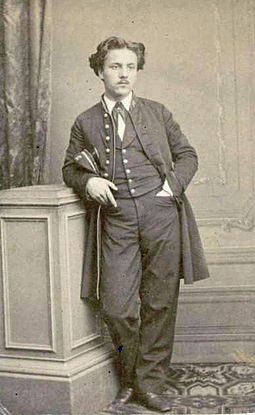- Get link
- X
- Other Apps
1191 Richard I of England first grew close to Berengaria of Navarre, daughter of King Sancho VI of Navarre at a tournament held in her native Navarre. Richard married Berengaria of Navarre in Cyprus before leaving for the Holy Land for the Third Crusade. The wedding was held in Limassol, Cyprus on May 12, 1191 at the Chapel of St. George and was attended by Richard's sister Joan. There were no children from the marriage; opinions vary as to whether it was ever a love match.
1543 Though Henry VIII was an assiduous reader of Scripture, he became concerned that his subjects were abusing the freedom he granted to them to read God's sacred words for themselves. A law was passed by Parliament on May 12, 1543 restricting the reading of the Bible in the new English translations to churchmen, aristocrats and wealthy merchants. It became illegal for artisans, laborers, servants or women (except noblewomen) to read the Bible for fear the effect it would have on them.
1551 The National University of San Marcos, the oldest continuously functioning university in the Americas, was founded in Lima, Peru, on May 12, 1551. Below is the The historic chapter house at the Basilica and Convent of Santo Domingo, where the University of San Marcos began its operations
1789 Three years after William Wilberforce became a Member of Parliament he came into contact with a group of anti-slave-trade activists. After a number of meetings and exchange of letters Wilberforce saw that God was calling him to be a figurehead of the movement. Wilberforce made his first major speech on abolition in the House of Commons on May 12, 1789. He reasoned the slave trade morally reprehensible and an issue of natural justice.
1803 German chemist Justus von Liebig was born on May 12, 1803. The invention of the silvered-glass mirror is credited to Liebig in 1835. His process involved the deposition of a thin layer of metallic silver onto glass through the chemical reduction of silver nitrate. Liebig improved the technique twenty years later by adding copper to ammoniated silver nitrate and sugar.
1820 Florence Nightingale was born on May 12, 1820 into a rich, upper-class, well-connected British family at the Villa Colombaia, near the Porta Romana, in Florence, Italy. She was named after the city of her birth. Florence had a strong desire to devote her life to the service of others from her late teens but at first she was respectful of her family's opposition to her working as a nurse, only announcing her decision to enter the field in 1844.
1820 International Nurses Day is celebrated every year on May 12, the birthday of Florence Nightingale. The modern nurse's uniform was developed from the habit of nuns. This goes back to the days when these Christian ladies were the first to look after the sick. These professional nurses then adopted a version of the nuns' dress.
1823 Sister Irene was born Catherine Rosamund Fitzgibbon on May 12, 1823. In October 1869 she opened the New York Foundling Hospital where babies could be left anonymously in a receiving crib with no questions asked. Forced to evolve her own methods of dealing with foundlings and unwed mothers, Sister Irene initiated a program of placing children in foster homes whenever possible, with provision for legal adoption when desired. She is recognized as one of the pioneers of modern adoption.
 |
| Effigy of Berengaria at L'Épau Abbey, Le Mans By MOSSOT |
1543 Though Henry VIII was an assiduous reader of Scripture, he became concerned that his subjects were abusing the freedom he granted to them to read God's sacred words for themselves. A law was passed by Parliament on May 12, 1543 restricting the reading of the Bible in the new English translations to churchmen, aristocrats and wealthy merchants. It became illegal for artisans, laborers, servants or women (except noblewomen) to read the Bible for fear the effect it would have on them.
1551 The National University of San Marcos, the oldest continuously functioning university in the Americas, was founded in Lima, Peru, on May 12, 1551. Below is the The historic chapter house at the Basilica and Convent of Santo Domingo, where the University of San Marcos began its operations
1789 Three years after William Wilberforce became a Member of Parliament he came into contact with a group of anti-slave-trade activists. After a number of meetings and exchange of letters Wilberforce saw that God was calling him to be a figurehead of the movement. Wilberforce made his first major speech on abolition in the House of Commons on May 12, 1789. He reasoned the slave trade morally reprehensible and an issue of natural justice.
1820 Florence Nightingale was born on May 12, 1820 into a rich, upper-class, well-connected British family at the Villa Colombaia, near the Porta Romana, in Florence, Italy. She was named after the city of her birth. Florence had a strong desire to devote her life to the service of others from her late teens but at first she was respectful of her family's opposition to her working as a nurse, only announcing her decision to enter the field in 1844.
1820 International Nurses Day is celebrated every year on May 12, the birthday of Florence Nightingale. The modern nurse's uniform was developed from the habit of nuns. This goes back to the days when these Christian ladies were the first to look after the sick. These professional nurses then adopted a version of the nuns' dress.
 |
| Russian Sisters of Mercy in the Crimea, 1854-1855 |
1823 Sister Irene was born Catherine Rosamund Fitzgibbon on May 12, 1823. In October 1869 she opened the New York Foundling Hospital where babies could be left anonymously in a receiving crib with no questions asked. Forced to evolve her own methods of dealing with foundlings and unwed mothers, Sister Irene initiated a program of placing children in foster homes whenever possible, with provision for legal adoption when desired. She is recognized as one of the pioneers of modern adoption.
1838 The Reverend Samuel Marsden died on May 12, 1838. Marsden was the Australian colony's senior Anglican cleric in the early 1800s. Though formally based in New South Wales, Marsden developed an interest in evangelizing New Zealand and in late 1814 he took his brig, the "Active" on an exploratory journey to the Bay of Islands, during which time he conducted the first Christian service on New Zealand soil to a 400-strong Māori congregation on Christmas Day 1814.
1845 The composer Gabriel Fauré was born in Pamiers, Ariège, Midi-Pyrénées, in the south of France on May 12, 1845. The young Fauré often played the harmonium at the small chapel attached to the school where his father was director. An old blind lady heard him and told his father that he ought to send his boy to a good music school. The 9-year-old Fauré was sent to a music college in Paris, where among his teachers was Camille Saint-Saëns, who became a lifelong friend.
 |
| Fauré as a student, 1864 |
1881 Tunisia was conquered by the Ottoman Empire between 1534 and 1574. The Ottomans held sway for over three hundred years until the French colonization. Tunisia became officially a French protectorate in on May 12, 1881.
1918 The RMS Olympic, a sister ship to the Titanic, was used as a troopship during World War I. On May 12, 1918, while en route to France with US troops, the Olympic sighted a surfaced German U-boat, U-103. The Olympic's gunners opened fire, but the U-boat was able to dive below the surface. The Olympic then turned and rammed the U-boat, sinking it with the loss of nine crewmen. The sinking of U-103 made the RMS Olympic the only merchant ship in World War I to have sunk an enemy vessel.
1925 The Tashkent Soviet was a public organization set up in Tashkent during the Russian Revolution. It gradually extended its power after the First World War. In 1924, the Soviet Union was reorganized, and the Uzbek Soviet Socialist Republic was established. Uzbekistan became a constituent republic in USSR on May 12, 1925.
1926 The first consistent, verified, and scientifically convincing attainment of the North Pole was on May 12, 1926, by Norwegian explorer Roald Amundsen and his US sponsor Lincoln Ellsworth from the Italian built airship Norge.
1926 The General Strike was a nationwide stoppage between May 3 -May 12, 1926 in the UK. The strike was called by the General Council of the Trades Union Congress in an unsuccessful attempt to force the British government to act to prevent wage reduction and worsening conditions for 1.2 million locked-out coal miners. The Chancellor of the Exchequer, Winston Churchill proposed to force the striking miners back to work by cutting off poor relief to their wives and children.
1932 Ten weeks after his abduction, the infant son of Charles Lindbergh, Charles Jr., was found dead on May 12, 1932. Bruno Richard Hauptmann, a German immigrant carpenter, was arrested and executed for the crime. For four years the Lindbergh case was a worldwide obsession. Sadly several lunatics sent abusive letters threatening the Lindbergh’s second child. The kidnapping eventually led to the Lindbergh family spending fours years exiled in Europe to get away from the public hysteria.
1937 When the BBC televised George VI of the UK's coronation on May 12, 1937, the scenes were watched by an estimated 10,000 subscribers to the service. Pictures were transmitted from Alexandria Palace relayed by a cable that stretched from the studio to the coronation activity, being unplugged and moved about with the camera. The BBC sent a Christmas card to all television owners that year.
1941 German civil engineer and inventor Konrad Zuse presented the Z3, the world's first working programmable, fully automatic computer, in Berlin on May 12, 1941. Program code and constant data were stored on punched film. The German Aircraft Research Institute used it to perform statistical analyses of wing flutter.
1967 Throughout their career, Pink Floyd experimented with their sound. During their Games for May concert at the Queen Elizabeth Hall in London, on May 12, 1967, the group first used an early quadraphonic device called an Azimuth Co-ordinator. Using four different channels of audio, it was an early version of surround sound.
2002 Michael Schumacher's motor racing career was not without controversy. During the May 12, 2002 Austrian Grand Prix, Schumacher's teammate Rubens Barrichello was set for a dominating race win. However, due to team orders from Ferrari he had to withdraw his position to give Schumacher the win to improve his championship points. This was one of the most controversial Formula 1 wins ever and was met with much hostility from fans and the FIA.
2008 The Burj Khalifa skyscraper, the world's tallest building, was constructed in the 2000s in the Business Bay district of Dubai, United Arab Emirates. When it reached a height of 636 metres on May 12, 2008, the Burj Khalifa surpassed its nearest rival, the KVLYTV mast in North Dakota, by seven metres. It reaches the height of 829.8 metres (2,722 ft) and has 163 floors and has a curtain wall equivalent to 17 football pitches.
2010 Theresa May first became a Conservative Party MP for Maidenhead at the 1997 general election. She very quickly rose up the ranks, joining William Hague's shadow front-bench opposition in 1999 as education spokesman, May became the UK Home Secretary on May 12, 2010. She remained as Home Secretary for six years, until she succeeded David Cameron as United Kingdom's Prime Minister in 2016. She was the longest-serving Home Secretary for 60 years.

Comments
Post a Comment